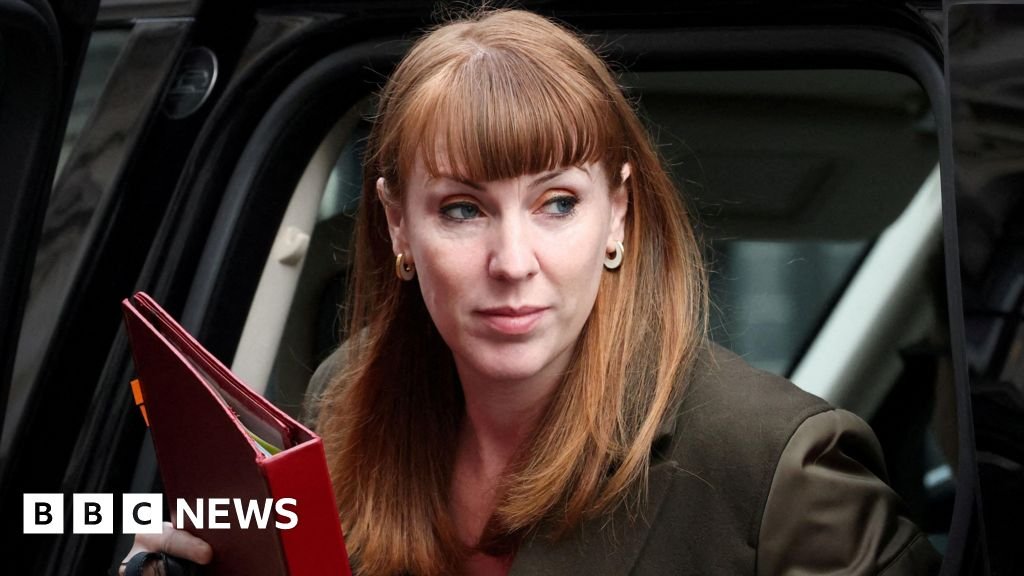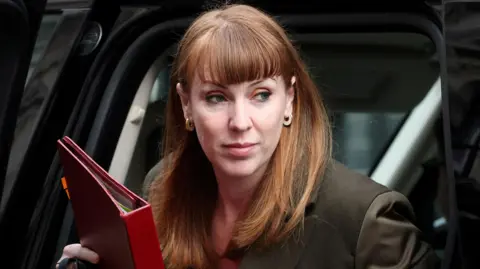Rayner replacement as Labour deputy must be a woman, says Baroness Harman

 Reuters
ReutersFormer Labour deputy leader Harriet Harman said the party must pick a woman from outside London to replace Angela Rayner as the party’s deputy.
The party’s ruling National Executive Committee (NEC) will hold talks on Monday to set the timetable and rules for the contest, which is shaping up to be a battle over the direction the party takes.
In previous deputy leadership elections, Labour members, unions and MPs have had a say in the outcome but the NEC may change the rules in an effort to speed up the contest.
Baroness Harman, who served as deputy to Gordon Brown and Ed Miliband, said the party needed to pick a replacement who will “broaden the reach of the leader and galvanise the party”.
Baroness Harman told BBC Radio 4’s Today programme: “I think that, in terms of extending the breadth of the leadership, it probably needs to be somebody from outside London and it definitely needs to be a woman.
“We need somebody who is not a counterpoint to the leader, but is complementary to the leader, will broaden the reach of the leader and galvanise the party.”
Baroness Harman told the BBC she was “dismayed and disappointed” that Rayner had left government.
This was “an election for the deputy leadership that nobody wanted”, she said – but given Labour were in power it was “right” to act fast to replace Rayner.
Labour’s rulebook sets a high bar to entry into the race, as candidates will need the support 80 Labour MPs – 20% of the parliamentary party – to get on the ballot.
Candidates must also have at least either three affiliates’ groups, including two unions, or 5% of local parties.
Those who clear the bar face a vote by party membership.
The BBC understands the NEC will be presented with proposed rules including hustings for MPs on Wednesday, with nominations closing 17:00 BST on Thursday.
Candidates who have the backing would then seek nominations from local parties and unions before a vote.
Foreign Affairs Committee chairwoman Dame Emily Thornberry became the first high-profile figure to announce she was thinking about a bid on Sunday.
Dame Emily was a shock omission from Sir Keir’s government, having been his shadow international trade secretary in opposition.
On Monday, former transport secretary Louise Haigh called for sweeping “economic reset” and reforms to Labour’s rigid fiscal rules in an article in the New Statesman, but fell short of declaring a bid to become deputy leader.
In government, Haigh was seen as a leading left-wing voice at the Cabinet table, before quitting last year after it emerged she pleaded guilty to a fraud offence a decade ago.
Speaking at the weekend, Labour’s Mayor of Greater Manchester, Andy Burnham said the contest was an opportunity to have a “discussion about the internal management”.
Burnham warned the Cabinet lacked “balance” after Rayner’s exit, and called for another voice from the north of England as deputy.
He suggested Haigh or ex-Commons leader Lucy Powell would help to counter what he called the “London-centricity” under Sir Keir’s leadership.
Shabana Mahmood, who on Friday was appointed home secretary in a major shake up of ministers, has ruled herself out of the race.
“My top priority is securing our borders – I will not be running for deputy leader of the Labour party,” she told reporters.
Other ministers have been floated as potential replacements, including Alison McGovern, while among MPs, NHS doctor Rosena Allin-Khan has been touted.
The contest was triggered by Rayner’s resignation following an investigation which found she had breached the ministerial code after admitting she had underpaid £40,000 in stamp duty on a new home earlier this year.
Her resignation sparked a major reshuffle, which saw Rayner replaced by David Lammy as deputy prime minister and Steve Reed at the housing department.
The shake-up saw Yvette Cooper become foreign secretary and replaced as home secretary by Mahmood – who had been justice secretary.
With Rachel Reeves remaining as chancellor, this is the first time the UK has had three women in the most senior cabinet roles alongside the prime minister.
Sir Keir now faces the prospect of a party conference overshadowed by manoeuvring for the deputy leadership role vacated by Rayner, who was popular among the grassroots.
Rayner, who was seen as a bridge between government and the backbenches, was both deputy Labour leader and deputy prime minister.

Discover more from News Hub
Subscribe to get the latest posts sent to your email.








